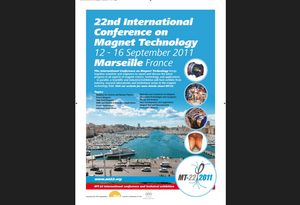MT-22 to open in Marseille
9 Sep 2011
Beginning Monday, 12 September 2011, over 900 of the world's foremost experts in all aspects of magnet technology will gather in Marseille, France for the 22nd meeting of the biennial Magnet Technology conference (MT-22). First established in 1965, the MT is the world's largest gathering dedicated specifically to advancing the science and technology of magnet applications—the MRI machines that allow for non-invasive examination of the human body and high-energy particle physics helping to understand the universe and the fundamental constituent of matter... A typical example for fusion technology is the manufacturing of powerful, high-field and high-current superconducting cables that will contain, shape, and drive plasmas in fusion devices such as ITER.
"In the four decades since the MT conference began, we have witnessed enormous gains in both the performance and applications of permanent, resistive, pulsed, hybrid and superconducting magnets," says Conference Chair Neil Mitchell. And it is with great pride that this year, which happens to be the 100th anniversary of the discovery of superconductivity and the 50th anniversary of applied superconductivity (which will be celebrated during the conference), the ITER Organization—as the emblematic project that will be pushing the boundaries of existing magnet technology in a wide variety of areas—together with the French Commissariat à l'Energie Atomique et aux Energies Alternatives (CEA) have decided to host this important event, where the most recent developments in magnet technology are exchanged.
"ITER is now building the largest set of magnets ever seen and therefore the ITER Organization is a fitting host for this conference," says ITER Director-General Osamu Motojima. "In the course of the week you will get opportunities to hear about the status of ITER construction and even see some of the prototype components. I think a conference of this type, based on a generic technology, is an excellent opportunity to see how ITER is benefitting from, and contributing to, developments in associated fields.
The record number of 979 submitted abstracts highlights the interest in the field. "This strong interest shows the vitality of our discipline in all the topics of the conference at the moment we are celebrating the centenary of superconductivity and also fifty years of applied superconductivity, which is the main focus of our conference," Jean-Luc Duchateau, the scientific program chair for MT-22, states.
In parallel to the technical sessions of the conference, ITER and CEA are organizing a scientific and industrial exhibition to be held on site at the conference venue, which will allow scientists and engineers involved in magnet technology research to interact with the companies and organizations that are responsible for building the actual hardware that comprises the world's most sophisticated and advanced magnet systems.
A Press Conference will be held at 11:30 a.m. on Monday, 12 September at the Conference Center, Salle Riou. Speakers will be ITER Director-General Osamu Motojima, Maurice Mazière, Director of CEA Cadarache and MT-22 Conference Chairman Neil Mitchell.
More information on all aspects of the conference taking place at the Parc Chanot may be found on the MT-22 web site at www.mt22.org.


